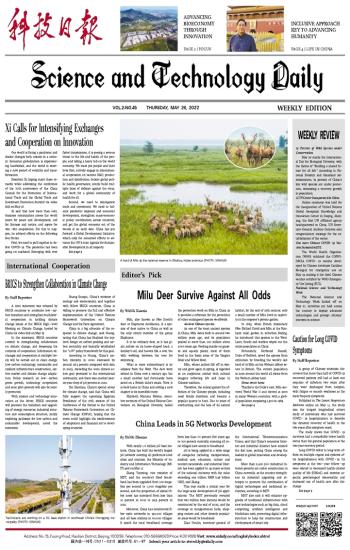
 Inclusive Approach Key To Advancing Humanity
Inclusive Approach Key To Advancing Humanity Advancing Bioeconomy Through Innovation
Advancing Bioeconomy Through Innovation Xi Calls for Intensifying Exchanges and Cooperation on Innovation
Xi Calls for Intensifying Exchanges and Cooperation on Innovation Milu Deer Survive Against All Odds
Milu Deer Survive Against All Odds WEEKLY REVIEW
WEEKLY REVIEW BRICS to Strengthen Collaboration in Climate Change
BRICS to Strengthen Collaboration in Climate Change Caution for Long COVID Symptoms
Caution for Long COVID Symptoms China Leads in 5G Networks Development
China Leads in 5G Networks Development PHOTO
PHOTO WECHAT ACCOUNT
WECHAT ACCOUNT E-PAPER
E-PAPER
A group of Chinese scientists discovered that more than half of COVID-19 recovered patients still had at least one sequelae of infection two years after they were discharged from hospital, with fatigue or muscle weakness as the most frequent symptoms.
Published in The Lancet Respiratory Medicine online on May 11, the study was the longest longitudinal cohort study of individuals who had survived COVID -19 hospitalization to describe the dynamic recovery of health in the two years after symptom onset.
The study shows that COVID -19 survivors had a remarkably lower health status than the general population at the two-year recovery period.
Long COVID refers to long-term effects on multiple organs and systems after hospitalization with COVID -19. Its symptoms at the two -year follow -up were related to decreased health-related quality of life (HRQoL) and exercise capacity, psychological abnormality, and increased use of health care after discharge.
After two years of recovery, 31 percent of the investigated patients suffered from fatigue or muscle weakness, whereas the figure concerning matched non-COVID-19 controls was only five percent. Also 31 percent of the recovered patients have sleep difficulties, and the number for the control group was only 14 percent.
As to mental health, 13 percent of the participants had anxiety, and 11 percent had depression at two years, and the figures for the control group were three and one percent respectively.
Cao Bin, lead researcher and professor at China-Japan Friendship Hospital, said, "Vertical and multi-stage follow-up of COVID-19 survivors, especially those who suffer from long COVID, is of great importance to understand the long course of this new and sudden infectious disease, as it is to the further exploration for recovery plans."
"It is obvious that we need to offer continuous support to a large proportion of COVID-19 patients, and research on vaccines, new treatment methods and whether the virus mutation will impact people's long-term health," said Cao.

 Next
Next



